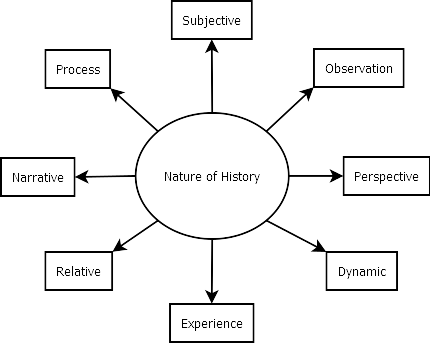
History, study of past. It is crucial to understand nature of History as it studies events happened in past and most of the time, past events which influences our present. Hence to have introductory look at the nature of History becomes significant.
I think following 8 factors plays pivotal role in analyzing Nature of History.
- Subjective
History is the study of past (may include subjects and objects) but most important is that the Human interactions with the objects and subjects in nature, institutions (Social, Economic, administrative), hence humans and their concern become more important in History. For example, who is writing History, About What, and When & where these are highly subjective aspects in History. So, I consider that subjectivity is inseparable in study of History.
- Observation
Whether Writer or student of History, what they observe in specific Historical event could differ drastically from person to person. For Example, Independence of India, in this event colonial, feminist, nationalist, economic historians may observe different points in same event and could raise range of different concerns regarding same event.
- Perspective
Stand point is another important aspect in understanding Nature of History, as a War can be interpreted from multiple angles or as many angles as the numbers of stakeholder/related people and institution. War from victors, losers, soldiers from both sides, allied parties from both camps, armaments industry, traders, farmers, and common people may have varied spectrum of perspective as per their concern.
- Dynamic
History as a subject is not rigid, understanding of History may change over the period of time with the discovery of new reference, sources and information. Interpretating Historical event is continuous activity and contemporary events may lead to rethink about historical events. For example, occurrence of Corona pandemic leads to study of previous pandemics occurred in history. Another concern is that after emergence of new ideology or school of thought, new perspective or angle could be added to the understanding of historical event.
- Experience
Experience of an individual or of a community regarding particular historical event emphasis more on their history writing, Holocaust for Jews, and discrimination at various levels due to Caste, and Racial discrimination due to place of Birth and color of skin. These experiences of individual as well as at the mass or community level play tremendous role in writing, reading and interpreting History.
- Relative
I think we need to look at historical events in relative manner, single conclusion and unanimousness is harmful for historical studies. We interpret and understand any event as per our convenience or its positive or negative impact on us. For example, European trading companies receiving commercial concessions and land grants in India in 17th Century, Now consider these event’s interpretation in 17th century and in 20th century could be different. Introduction of Railways in India by British colonial government, British view point and Indian Nationalist can have completely opposite stand point on it. Pro-British view like British introduced modern Education, Law and Order, Transportation in India and looking at the same points from the late 19th and 20th century Indian National Movements like Swadeshi, Swaraj, National Education and Boycott of Foreign goods. Works of Dadabhai Naorojee, R. C. Dutt, B. G. Tilak, Mahatma Gandhi have seen same above-mentioned points of pro-British in a very different and critical way. This relativity is important for understanding History.
- Narrative
White Man’s burden, Racial Supremacy, Breathing Space, Sons of Soil, Asia for Asians, etc. Narrative like above mention for example purpose only, influence history writing and reading in respective time periods. A pro-British history writer or reader may highlight 18th and 19th century economic, political and socio-cultural expansion of British political authority in glorified manner and same period could interpreted differently or in opposite way by the narratives of industrial labor, colonized territory, suppressed societies. These dominant narratives of the time play significant role in understanding History.
- Process
Historical process at macro level and its impact at micro level or vice a versa. Like feudalism, colonialism, commercialization, commodification, decolonization, Globalization, etc., these process plays tremendous role in study of History as it influences most spheres of human life at individual as well as at collective level. Hence study of these process and their wider implications on History is important.